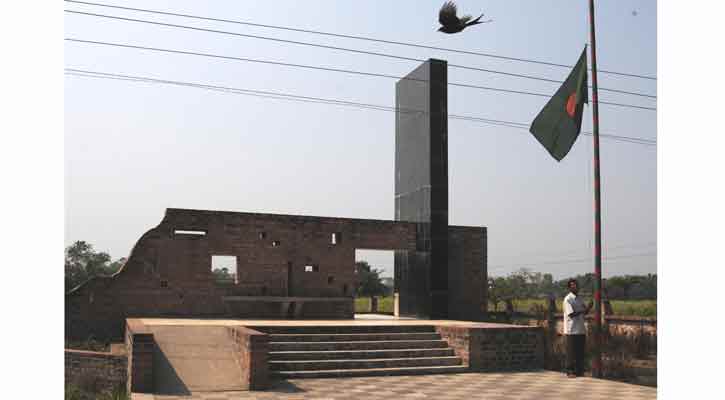-
Home
-
About
Introduce to Upazila
History-Culture
Geography & Economics
-
Upazila Parishad
Chairman Office
Monthly Meeting
Annual Development Plan
Upazila committee meeting
Others
বার্ষিক উন্নয়ন কর্মসূচি
বার্ষিক আর্থিক বিবরণি
-
Administration
About Organogram
Schedule & Meeting
-
Government Offices
Security & Discipline
Health Related
Agriculture & Food
Engineering & Communication
Human Resources
Education Related
-
Other Institution
Educational Institutions
Religious Institutions
- E-Services
- Gallery
Chuknagar Slaughterhouse
Not only the liberation war of Bangladesh, Chuknagar genocide is one of the worst genocides in the history of the world. On May 20, 1971, during the Great War of Liberation, the brutal massacre was carried out by the Pakistani barbaric army at Chuknagar, a small town in Dumuria, Khulna. They killed 10 to 12 thousand freedom fighters indiscriminately by carrying out this surprise attack.
The single biggest incident of genocide committed by Pakistani aggressors in Bangladesh is Chuknagar Genocide Day on Tuesday.
The Chuknagar massacre has written a black chapter in the history of the War of Independence. Today's Chuknagar has also become a silent witness to the brutal torture, torture and killings carried out by the Pakistani army in the war of liberation.
Although most of those killed that day were men, Pakistani women also killed many women and children. Many children were breastfed, and the cannon was fired. The mother was martyred after the killer's bullet hit her in the chest, but the ignorant child still tried unsuccessfully to quench her hunger by keeping her breast in her mouth.
It is difficult to get an accurate idea of how many such incidents took place that day.
Elders in the area said that a group of people in the south, including Khulna in Bangladesh, decided to go to India to save their lives as they could not bear the oppression of the Pakistani forces. In mid-May, thousands of people from Bagerhat, Rampal, Morelganj, Kachua, Sharankhola, Mongla, Dakop, Batiaghata, Chalna, Faridpur, Barisal and other parts of greater Khulna left for India. They chose Chuknagar in Dumuria as a transit route to India. On the night of May 19, everyone reached Chuknagar. The next morning they gathered at Chuknagar to enter India through the various borders of Satkhira and Kalaroa. There was no place to store sesame seeds. Thousands of people took shelter in Chuknagar's Patokhola Beel, Kanchabazar Chandni, football field, Kali Mandir and other shrines.
These people who go to be refugees spend sleepless nights all night. After resting in the morning, they started cooking rice. Someone was transmitting energy to the body with chire-muri and other dry food.
But on May 20, at around 10 am, in three trucks, the Pakistani army suddenly came to a halt at Jhautala (then Patkhola) in Chuknagar Bazar. They had light machine guns and semi-automatic rifles. People in white robes also come. They continued to kill people indiscriminately till 3 pm. Many jumped into the river hoping to escape the carnage. Many of them drowned. The smell of the corpse made the air in and around Chuknagar heavy. There are corpses and corpses lying in the fields, fields and canals.
After the brutal slaughter of the barbaric Pakistanis, the locals started taking the bodies from these places and throwing them in the river.
The bones of the martyrs of that day and various ornaments on their bodies can still be found in the crop lands of Chuknagar. There are no statistics on how many people gathered in Chuknagar that day. Many people have millions of ideas.
Khulna district president of the committee to eliminate the killer brokers. Sheikh Baharul Alam told banglanews that the Chuknagar massacre was the single biggest massacre by the Pakistani aggressors in Bangladesh.
He said a monument has been erected at this place.
Meanwhile, on the occasion of Chuknagar Genocide Day, the martyrs of the genocide will be paid homage by laying wreaths at the massacre ground at the initiative of Chuknagar Genocide '71 Memorial Protection Council.
30 from Khulna Mr. Distance at Chuknagar Bazar 2 keys to the market in Chuknagar Mr. Previously killing grounds. Here motorcycles, vans, rickshaws, private, Easy bikes, Mahindra or walks on foot.

Planning and Implementation: Cabinet Division, A2I, BCC, DoICT and BASIS






